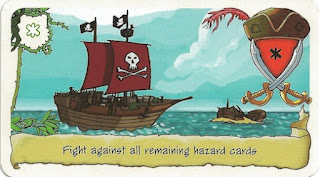So, I normally don't play solo games. Because I have so many friends? In my mind the answer is yes, but in reality it's probably because the part of board gaming that I enjoy is the social aspect. Yet, when some reliable sources (other blogs I read) highly recommended Friday (and when I realized it is really cheap), I decided to give it a try.
In the game Friday, you are on a deserted island - and you love it! Unfortunately for you, the infuriating Robinson has crashed on your island. So, you decide to teach him how to survive (not because you're nice, mind you, but because you really want him to gain the survival skills needed to leave the island by defeating pirates). Let's face it - Robinson was a bit of a wimp when he landed (and not very smart either). So, you go through teaching him the basics of survival. In terms of gameplay, you start with a basic deck of cards - Robinson's initial skills (as pitiful as they are). There is also a hazard deck, and each turn you draw two cards from the hazard deck and choose one of them to resolve. The hazard will give a certain number of cards that you can play for free, and any additional cards will cost you a life to play. If you have enough points to defeat the hazard, then it goes into your deck (it has two images on it - one representing the hazard and one representing what Robinson learns by defeating it). If you lose the hazard, you lose life equal to the difference - but when losing life, you can also trash cards that you played based on how much life you lose (which can let you get rid of cards that are -1 strength). Unfortunately, you don't live in a time-warp where Robinson can do this forever. He is getting older. This is represented by having an "aging" (bad) card added to your deck each time you have to reshuffle it. You will go through the hazard deck three times (with it getting progressively harder), and then if Robinson is still alive, he fights two pirates. If you win this, Robinson has left the island, and you are left in peace!! (Otherwise, he died while fighting the pirates - so either way, you win, because he's leaving you alone.)
 |
| Cards are dual use |
The second thing that I like about Friday is that it is incredibly challenging - and that there are different difficulties in which you can play the game. Specifically, there are four different difficulties, and they change what the initial cards and lifepoints are. It amazes me how tightly balanced this game is, because a very slight adjustment to the starting conditions can make the game drastically more difficult. The first time I played was on Level 1 (since I was learning). I scraped out a victory with about one life left. So, I began trying Level 2 (which means that I start with an aging card in my deck). I played Level 2 about 5-10 times in a row, and I never won; I didn't even come especially close to winning. I went back to Level 1 - won again, this time by more than I did the first time. I think that these different difficulties make Friday have a lot more replayability than I expected from a solo game.
 |
| You must defeat two pirates to win |
The only real thing that I can come up with as a con for Friday is very nit-picky. When playing the game, since the hazard cards are two sided, it can occasionally be a bit confusing to remember which card you are challenging at any given time. You are told to put the "free" cards on one side of the hazard and the cards that you sacrificed life for on the other side. However, when you actually look at that, it often looks like you just played one of your cards upside down, so it takes a second to register what exactly is going on.
Overall, I give Friday a 9.5/10. I originally was thinking 8, decided that 8.5 was more appropriate, and really just kept talking myself up from there. When I struggle to find a con with a game, that means that the game really probably deserves a 9.5. I recommend that everyone try Friday at some point or another, and if you're like me and both love board games and periodically travel for work, I think that Friday is crucial for your gaming collection.
If you like games where you are playing against the game itself, you might also want to check out Nemo's War, Defenders of the Realm, and Lord of the Rings: the Card Game.

